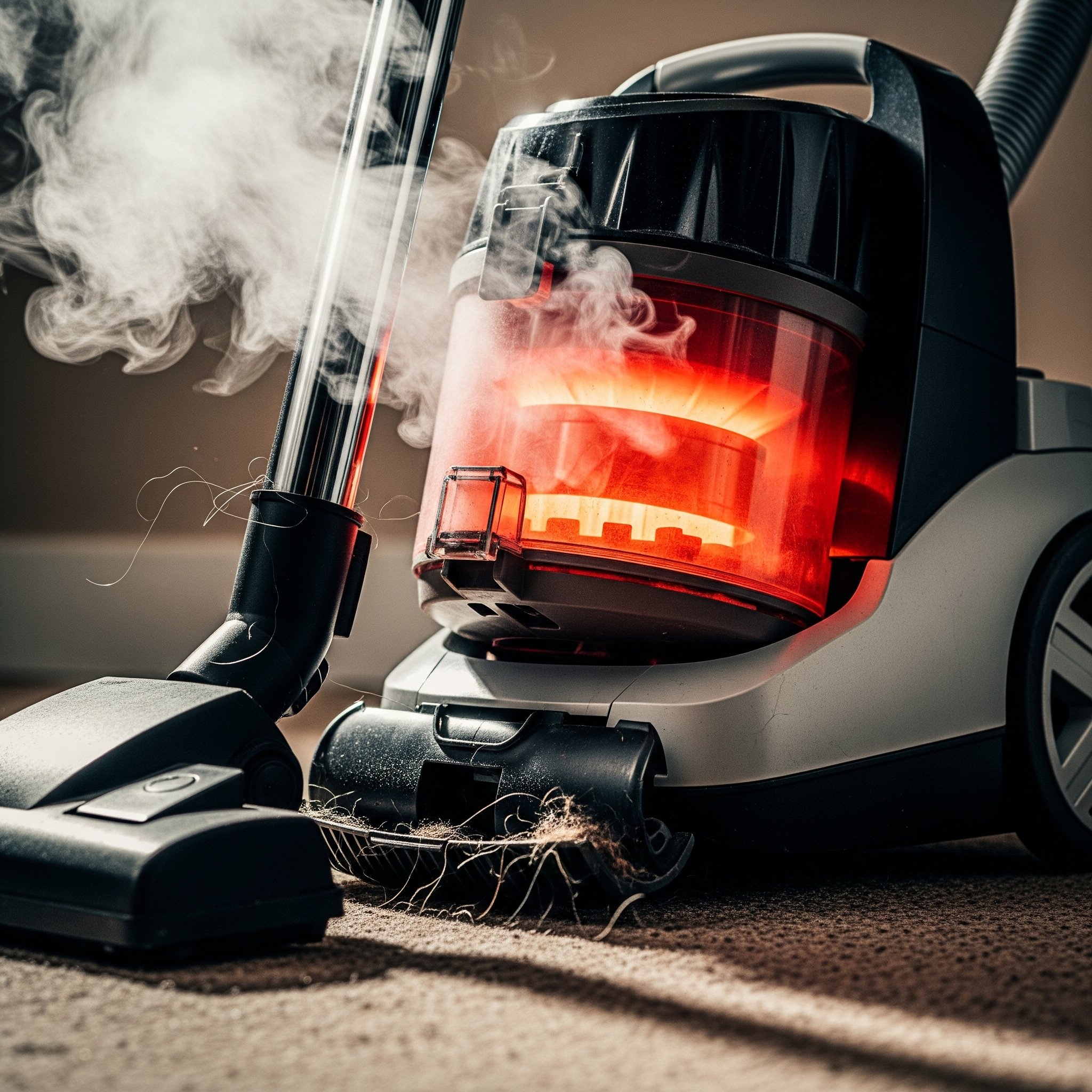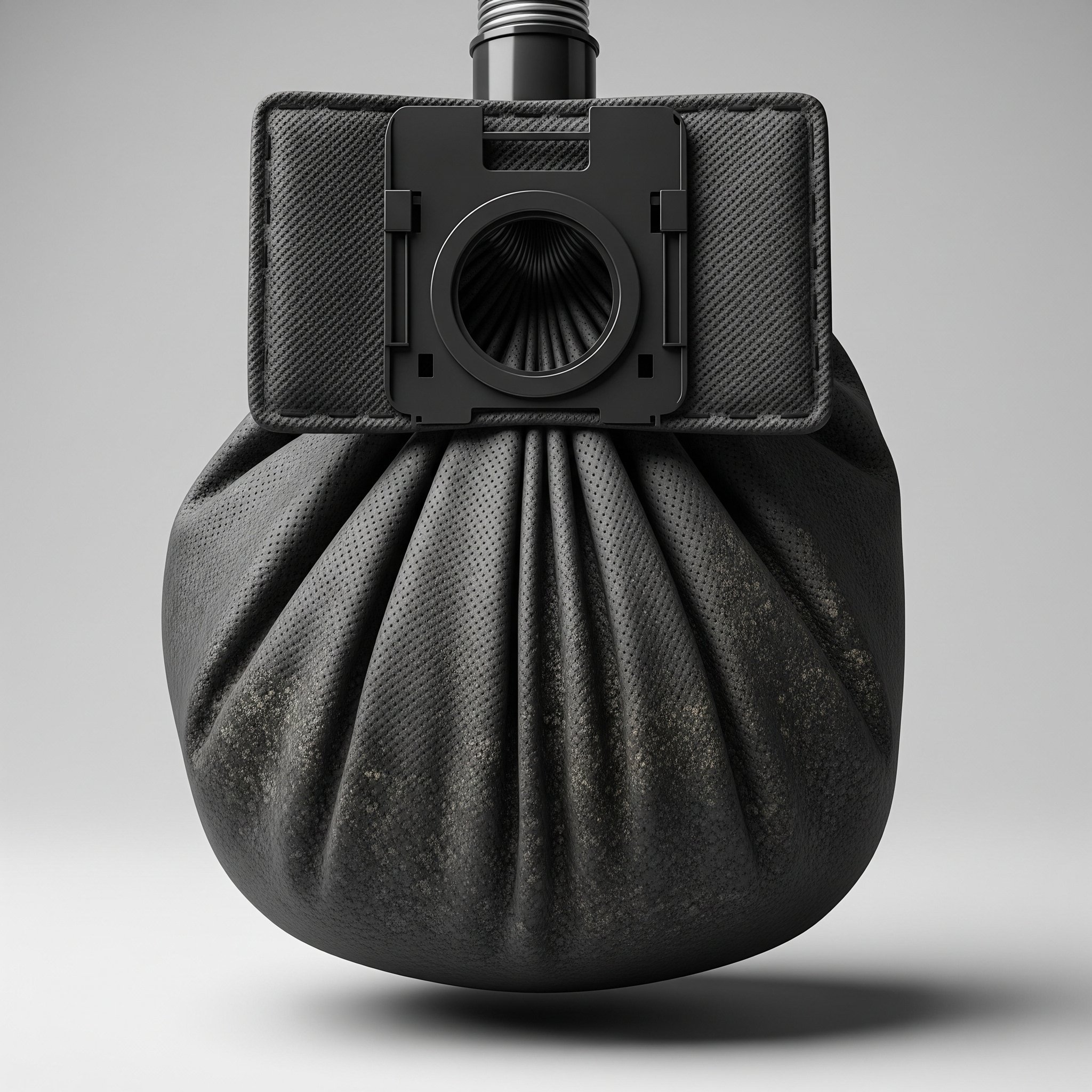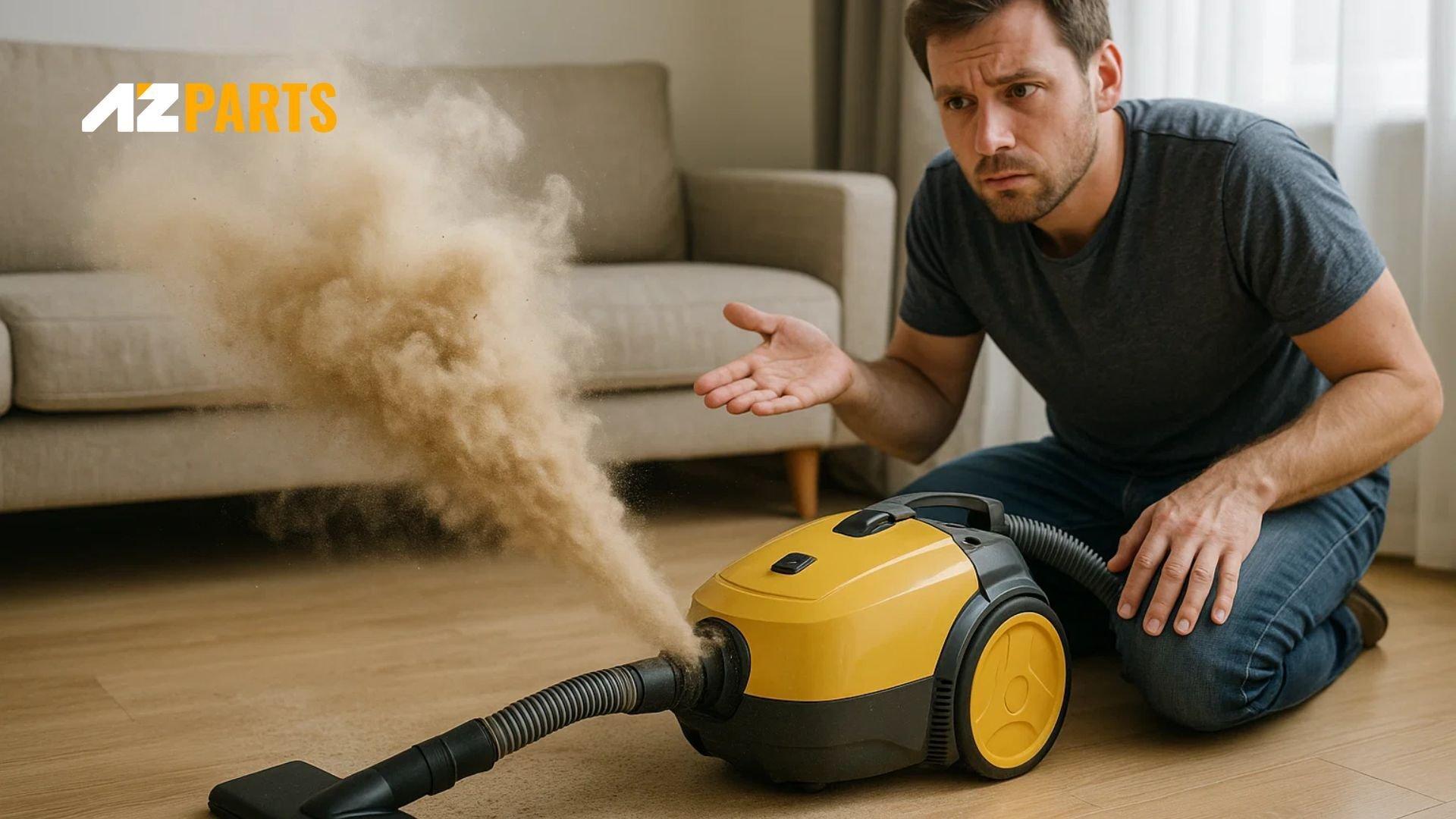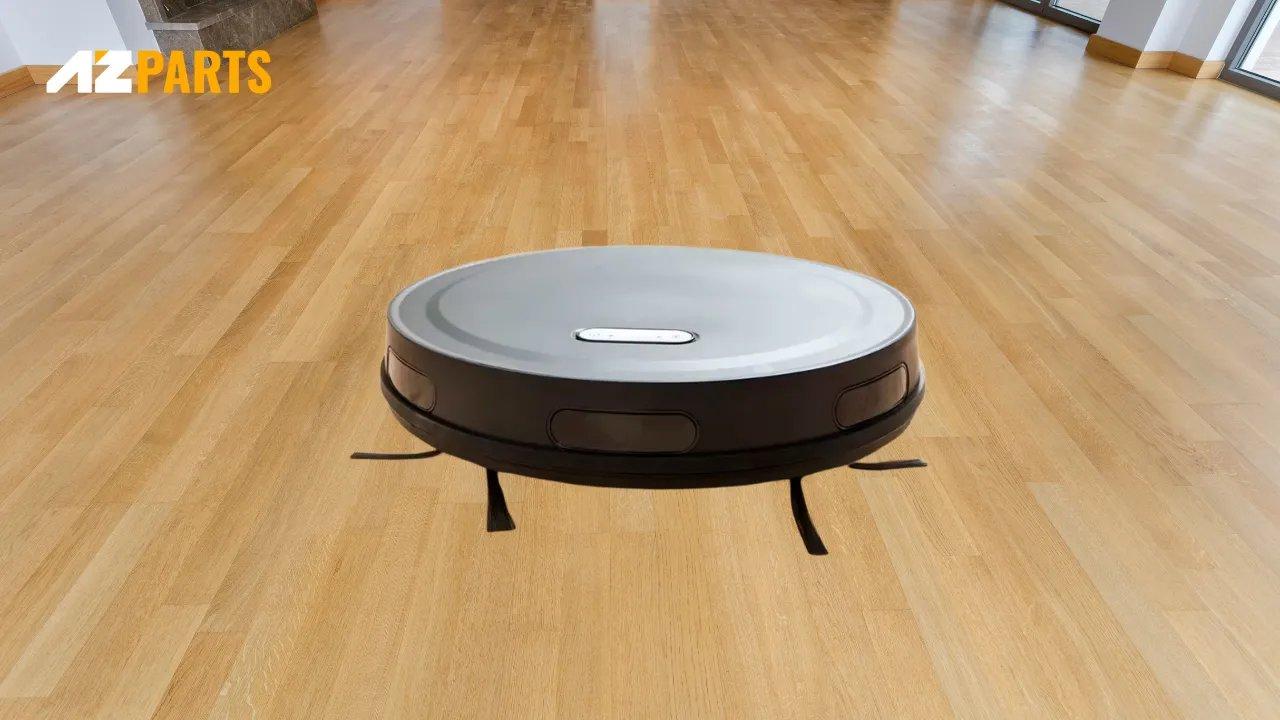Review
Why Does My Vacuum Keep Shutting Off?
Thanh Nga
Updated on July 30, 2025
7 min read
If your vacuum cleaner keeps shutting off during use, it’s more than just an inconvenience — it’s a sign that something may be wrong. From overheating and clogged filters to motor failures or electrical problems, several common issues could be behind this frustrating problem.
In this guide, AZParts will help you identify the root causes of sudden shutdowns and walk you through practical solutions — whether it’s a simple filter clean or a key part replacement. And when repairs are needed, we carry the compatible vacuum parts to get your machine running smoothly again.

What Are the Most Common Vacuum Cleaner Problems?
Vacuum cleaners are essential tools for keeping your home clean, but like any appliance, they can run into issues over time. From power failures to reduced suction, here are the most common problems that can affect your vacuum cleaner—and how to troubleshoot them.
1. Power Supply Issues
If your vacuum doesn’t turn on, the issue might lie with the power supply. Common causes include:
- Damaged power cord: Inspect the cord for any cuts, frays, or exposed wiring.
- Faulty outlet: Make sure the outlet is functioning by testing it with another device.
- Internal wiring problems: If everything else checks out, the problem may be internal, requiring professional repair.
For cordless models, check the battery and charging cable. If the vacuum isn’t charging properly or holds a charge for only a short time, the battery or charger may need replacement.

2. Overheating
Vacuum cleaners can overheat if:
- They've been running too long without breaks.
- There’s a blockage in airflow due to clogged filters or hoses.
When a vacuum overheats, it often shuts off automatically. Let it cool down completely before restarting, and ensure all filters and airflow pathways are clean and unobstructed.
3. Clogged Filters or Hoses
Dirty or clogged filters and hoses can drastically reduce suction. To prevent this:
- Clean or replace filters regularly as per the manufacturer’s instructions.
- Inspect hoses for debris or blockages and clear them out carefully.
Refer to your vacuum’s manual to find out how to access and maintain these components properly.
4. Full Dustbin or Bag
A full dustbin or vacuum bag restricts airflow and reduces suction efficiency. Empty the dustbin or replace the bag frequently, especially if your vacuum has a full-bag indicator light.

5. Motor Issues
If your vacuum has lost power or isn’t running smoothly, the motor might be at fault. Signs include:
- Weak or no suction
- Strange noises
- Failure to start despite having power
Motor repairs are complex and best left to trained technicians.
6. Blocked Airflow
Blockages in the hose, wand, nozzle, or internal ductwork can halt suction altogether. Common culprits include:
- Hair tangles
- Dust clumps
- Small objects accidentally vacuumed up
Carefully disassemble and clean all reachable areas to restore airflow.
7. Faulty On/Off Switch
If the vacuum won’t power on—or shuts off intermittently—the on/off switch could be faulty. Since this part is connected to the vacuum’s electrical system, professional diagnosis and repair are recommended.
8. Loss of Suction Power
A drop in suction performance can stem from several issues, such as:
- Clogged filters
- A full dustbin or bag
- Motor malfunction
- Cracks or leaks in the hose or nozzle
Carefully inspect and address each of these possibilities to restore full functionality.
9. Brush Roll Not Spinning
The brush roll is crucial for picking up dirt from carpets. If it stops spinning, check for:
- A broken or stretched belt
- Debris tangled around the brush
- Malfunctions in the brush roll motor
You may need to replace the belt or clean the brush. For more serious issues, consult a service technician.
Pro Tip: Regular maintenance—including emptying the dustbin, cleaning filters, checking for blockages, and inspecting moving parts—can help prevent most vacuum cleaner problems and extend the life of your machine.
How to Maintain Your Vacuum Cleaner and Prevent Future Problems
Proper vacuum maintenance isn’t just about keeping it clean—it’s the key to preserving its performance, suction power, and lifespan. Here’s how to care for your vacuum to avoid common issues down the line:
1. Empty the Dust Cup or Replace the Bag Regularly
Always empty the dust cup or replace the vacuum bag after each use or when it’s about two-thirds full. Allowing it to overflow can restrict airflow, strain the motor, and reduce suction efficiency.
2. Clean or Replace Filters
Dirty filters are one of the most common causes of poor suction and overheating. Follow the manufacturer’s instructions to clean or replace HEPA, foam, or cartridge filters regularly. In most cases, filters should be checked monthly and cleaned or replaced every few months, depending on usage.
3. Remove Debris from the Vacuum Interior
Dust, hair, and debris can accumulate inside the vacuum over time. Use a brush attachment to remove buildup inside the housing and hose area. Wipe the vacuum’s exterior with a damp cloth to keep it clean and prevent dust from transferring back into your home.
4. Maintain Accessories and Attachments
Your vacuum’s hose, wand, and other attachments also require care:
- Inspect hoses for cracks, splits, or blockages.
- Check the wand and other tools for clogs or signs of wear.
- Replace worn parts promptly to maintain performance.
5. Clean the Brush Roll and Replace the Belt
Hair and string can get tangled in the brush roll, reducing its ability to pick up debris. Remove any buildup regularly and inspect the brush roll for signs of wear. If your vacuum uses a belt-driven system, check the belt for stretching or cracking. A worn belt can prevent the brush roll from spinning properly and should be replaced as needed.
6. Store Your Vacuum Correctly
Where and how you store your vacuum can affect its longevity:
- In humid climates, store the vacuum in a dry, well-ventilated area to prevent moisture damage.
- In colder regions, avoid leaving the vacuum in unheated garages or sheds, as freezing temperatures can make the hose and cord brittle over time.
Frequently Asked Questions (FAQ)
1. What should I do if my vacuum cleaner won’t turn on?
First, ensure the vacuum is securely plugged into a working outlet. Inspect the power cord for any visible damage or fraying. Also, test the on/off switch to confirm it’s functioning properly. If the vacuum still won’t power on, the issue may lie within internal components such as a faulty motor or control board. In such cases, professional repair is recommended.
2. What should I do if my vacuum has lost suction?
Loss of suction is often caused by clogged filters, a full dustbin or bag, or blockages in the hose or attachments. Try the following steps:
- Empty the dustbin or replace the bag
- Clean or replace filters
- Inspect the hose, nozzle, and attachments for obstructions or cracks
- Check the brush roll for tangles or wear
If suction issues persist, the motor or internal seals may be compromised and should be examined by a technician.
3. Why aren’t the cleaning brushes spinning?
If the brush roll isn’t spinning:
- Turn off the vacuum and unplug it
- Remove any hair, thread, or debris tangled in the brush
- Check that the brush is properly installed
- Inspect the drive belt for wear or stretching
If the brush moves freely by hand but not while running, the drive motor may be faulty and will require professional servicing.
4. How often should I replace the filters in my vacuum cleaner?
Most manufacturers recommend replacing filters every 6 to 12 months, depending on usage and model. However, you should inspect the filters regularly and replace them when they appear dirty, clogged, or discolored, as this can significantly affect performance.
5. Why is my vacuum cleaner making loud or unusual noises?
Excessive noise can indicate problems such as:
- Worn bearings or motor issues
- Loose internal parts
- Debris stuck in the brush roll or hose
Ensure the vacuum is properly assembled and all components are secure. If the noise persists, stop using the vacuum and have it professionally inspected to prevent further damage.
6. Why does my vacuum cleaner smell bad?
Unpleasant odors usually result from:
- Dust or pet hair buildup
- Dirty filters
- Mold or bacteria inside the unit
To eliminate odors, clean the dustbin, replace or wash filters, and disinfect the vacuum’s interior components. Adding a vacuum deodorizer or using baking soda can also help with persistent smells.
7. How do I know if my vacuum motor is burnt out?
Signs of a burnt-out motor include:
- No suction despite power being on
- A strong burning smell
- Strange grinding or humming sounds
- Failure to start altogether
If you suspect motor failure, discontinue use immediately and consult a qualified technician to avoid further electrical issues or safety hazards.
Conclusion
A vacuum cleaner that shuts off suddenly is often caused by overheating, blockages, electrical faults, or motor issues. Regular maintenance, including cleaning vacuum filters, checking for blockages, and inspecting electrical components, can help prevent these problems. If your vacuum continues to shut off despite troubleshooting, it may be time to seek professional repair or consider a replacement.
Vacuum
- 1. Power Supply Issues
- 2. Overheating
- 3. Clogged Filters or Hoses
- 4. Full Dustbin or Bag
- 5. Motor Issues
- 6. Blocked Airflow
- 7. Faulty On/Off Switch
- 8. Loss of Suction Power
- 9. Brush Roll Not Spinning
- How to Maintain Your Vacuum Cleaner and Prevent Future Problems
- Frequently Asked Questions (FAQ)
- 1. What should I do if my vacuum cleaner won’t turn on?
- 2. What should I do if my vacuum has lost suction?
- 3. Why aren’t the cleaning brushes spinning?
- 4. How often should I replace the filters in my vacuum cleaner?
- 5. Why is my vacuum cleaner making loud or unusual noises?
- 6. Why does my vacuum cleaner smell bad?
- 7. How do I know if my vacuum motor is burnt out?
- Conclusion
Further Reading
Further Reading





